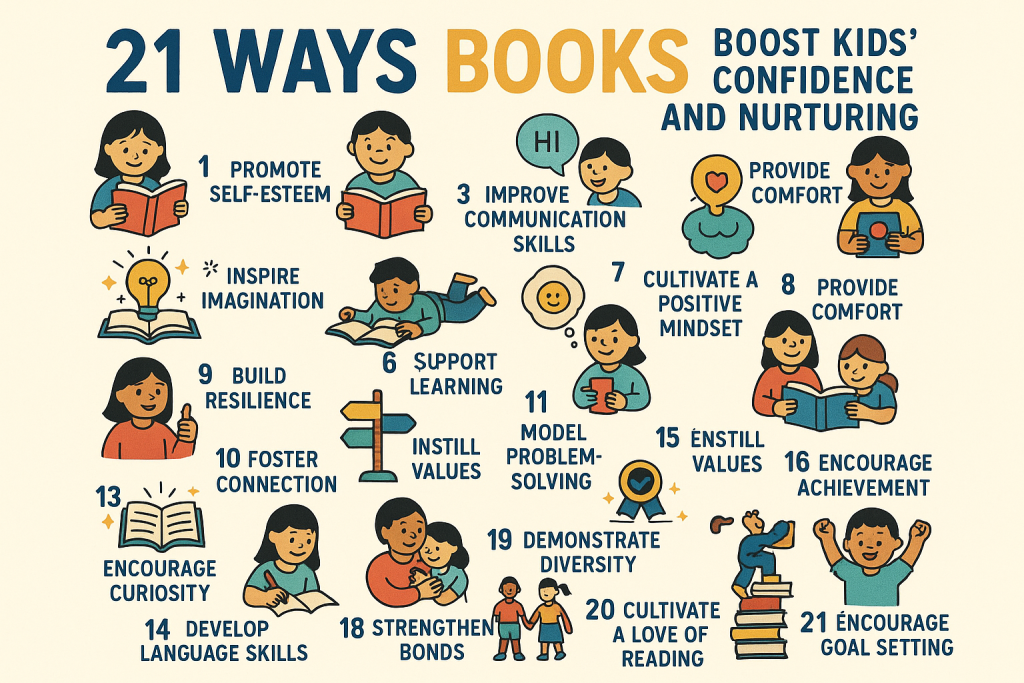
21 Ways Books Boost Kids’ Confidence and Nurturing
Reading books boost confidence in kids a powerful tool for nurturing confidence in children.
Here are 21 ways reading a book can help boost your child’s self-esteem and emotional growth:
1. Exposure to Diverse Characters
Children’s Books introduce children to various cultures and personalities, helping them understand and appreciate differences.
2. Relatable Experiences
Characters facing challenges can mirror a child’s own experiences, showing them that they are not alone.
3. Problem-Solving Skills
Many stories involve conflict resolution, teaching kids how to handle their own challenges.
4. Improved Vocabulary
Reading expands a child’s vocabulary, allowing them to express themselves more confidently.
5. Enhanced Imagination
Books stimulate creativity, encouraging children to think outside the box and feel empowered by their ideas.
6. Emotional Awareness
Stories often explore emotions, helping children recognize and articulate their own feelings.
7. Boosting Empathy
Understanding characters’ feelings fosters empathy, which enhances social interactions and friendships.
8. Encouragement to Ask Questions
Reading prompts curiosity and inquiry, boosting confidence in seeking knowledge.
9. Building Patience
Following a story from start to finish teaches patience and perseverance in understanding complex narratives.
10. Sense of Accomplishment
Completing a book gives a sense of achievement, reinforcing their ability to set and meet goals.
11. Fostering Independence
Reading independently nurtures self-reliance, giving kids confidence in their ability to learn on their own.
12. Encouraging Discussion
Kids’ mental health books provide a great platform for discussions, allowing children to express their thoughts and opinions comfortably.
13. Strengthening Family Bonds
Reading together creates shared experiences, fostering a sense of security and belonging.
14. Learning Life Lessons
Many stories impart important morals and lessons that help children navigate real-life situations confidently.
15. Improving Focus and Concentration
Engaging with a story requires focus, which enhances a child’s attention span and confidence in learning.
16. Creating Safe Spaces for Exploration
Books allow children to explore new ideas and scenarios in a safe environment, fostering confidence in their thoughts.
17. Inspiring Role Models
Many books feature strong role models, motivating children to aspire to similar qualities and behaviors.
18. Encouraging Creativity
Stories encourage creative thinking and imaginative play, boosting confidence in their artistic abilities.
19. Coping Mechanisms
Books boost confidence and address fears or anxieties can provide coping strategies, empowering children to manage their emotions.
20. Cultivating a Love for Learning
A love for reading encourages lifelong learning, helping children feel confident in their pursuit of knowledge.
21. Celebrating Achievements
Reading about characters who achieve their dreams helps children believe they can reach their own goals.
Conclusion
Books are more than just stories; they are gateways to building confidence and nurturing emotional growth in children.
By incorporating reading into daily life, parents can provide their children with invaluable tools for self-esteem and resilience. Encourage your child to explore the world of books, and watch them flourish!

Jennifer Wilson
Brave Little Minds was inspired by my journey as a mother living with bipolar disorder, and my heartfelt wish to help my son understand and process his feelings.
